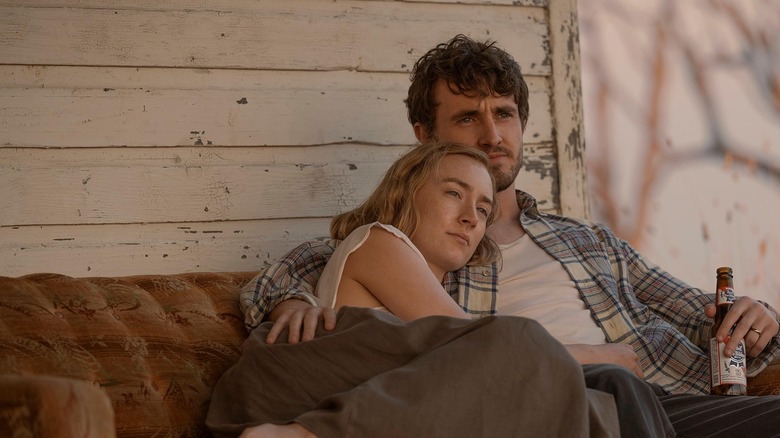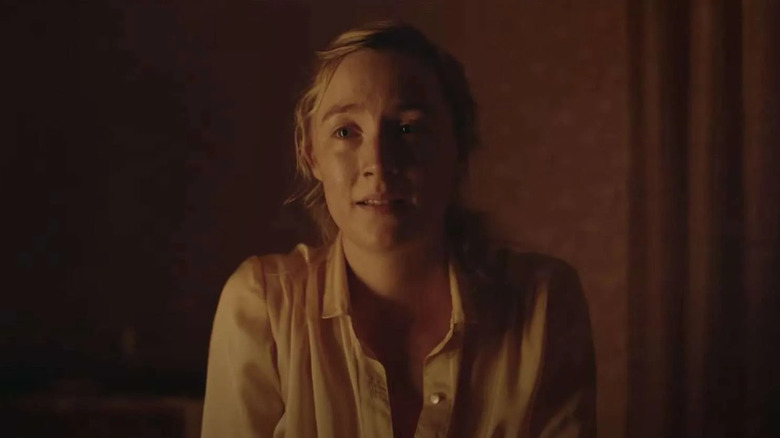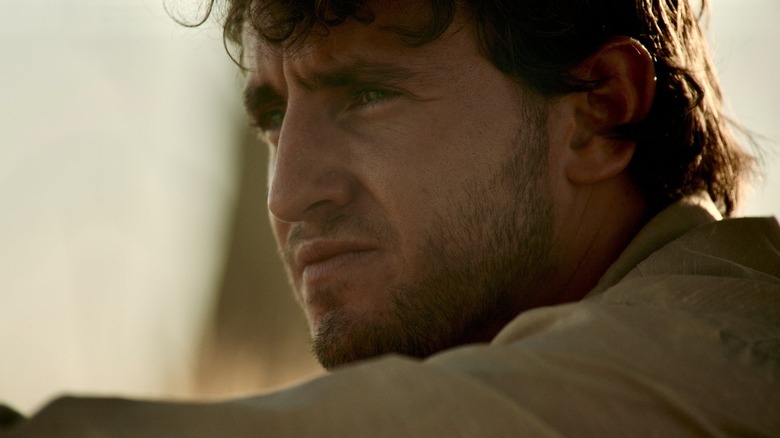The Most Confusing Moments In Foe Explained
This post contains spoilers for the movie "Foe."
Garth Davis' 2023 sci-fi film "Foe" is a somber, confusing mess of a film that calls its shots early on, but remains mysterious regardless. It's set in the near future of 2065 when the Earth's natural resources are dwindling. Hen (Saoirse Ronan) and her husband Junior (Paul Mescal) live in a remote family home that has been in Junior's family for generations. The trees around their house have all died and their marriage seems to be on the rocks; they fight and sleep in separate beds. Junior is also wary of visitors, assuming that Hen is having affairs ... which she might have had in the past.
One evening, Junior and Hen are visited by a man named Terrance (Aaron Pierce) whom Hen met years before. Terrance works for a well-moneyed astronautics corporation called OuterMore. OuterMore is planning a grand migration project that would relocate the Earth's population into massive space colonies somewhere off-world. Junior was selected by lottery to join the project as a test subject, proving humans can live off-world for an extended period. Junior and Hen would have a year to get their affairs in order, and then Junior would have to live in space for two years.
The twist: to make sure Hen isn't lonely, OuterMore also offers to make a clone of Junior that would take his place back at home.
This sounds like the premise of a classic sci-fi speculation story that one might see in an episode of "The Twilight Zone." However, "Foe" doesn't get to the clone part right away ... at least not as far as we know. Instead, the film is about Junior's weird, erratic behavior as he and Hen wait for Terrance to return in a year.
The most confusing thing: the basic plot
Warning: this slide will reveal the film's twist ending.
"Foe" is clearly a film about marital angst, and how another person can serve as a prison for your dreams. The dying world is a reflection of Hen's drying heart. It's hard for her to feel love for Junior, given his erratic behavior, suspicion, and insensitivity. In one notable scene, Hen has to push her face into a smile, reminding her that such an expression is still possible. Hen and Junior are not friends. They are foes. The year passes.
There is some odd intrigue at play. Terrance moves in with them and begins conducting weird, cruel tests on Junior. A lot of the tests seem illogically sadistic; it's never explained what Terrance is testing. Junior is outraged when Hen and Terrance have a drink together. He sees a large Junebug on the floor. He comments on it, but Hen doesn't answer. Is it a hallucination? Remember that bug.
Junior sees a burning barn in the night and instinctively runs toward it for reasons he can't understand. Junior finds mysterious tape recorders around the house, featuring Hen and Terrance expressing concerns. Weirdly, through all of this, Hen and Junior seem to be bonding again.
This may sound like a paranoid sci-fi thriller, but most audiences will be able to tell what's happening: Junior has already been replaced, and the bulk of the film follows his unstable clone. This is presented as a twist, but it's predictable. At the end of the film, the real Junior returns, and the clone Junior is reclaimed by OuterMore, leading to a tragic scene where the clone is euthanized. Hen hates it.
The Junebugs
There is an additional twist, however, unveiling a new theme. When the real Junior returns, he's just as brusque as he was at the beginning of the movie. Hen can't stand it and finally leaves him. She then returns later, happier and more docile. While she and Junior drink beer on the porch, she notices a large Junebug. She comments on it, but Junior doesn't answer.
The Junebug is something, it seems, that only clones can see. Perhaps it's another OuterMore tool to monitor their clones. Hen fell in love with her Junior clone, but left when the real Junior returned. Likewise, when Hen left, Junior got a clone of his own. These people couldn't connect with each other in real life, but idealized facsimiles were more sensitive lovers.
"Foe" is quite bleak, depicting a sad marriage well past the point of salvage. The only respite is retreating into an artificial fantasy, recalling an ideal version of your lover. There are scenes at the end of the film showing Hen on a plane, finally finding her own life again after so much unhappiness.
The plot of "Foe" invokes the modern encroaching of CGI, and how our emotional needs can't be met by other people, forcing us to turn to soulless technology. The storytelling is muddled, overwrought and bordering comedic in its bleakness, but at least director Davis seemed to have something on his mind. It would have been a better film, however, if it was revealed up from that Junior was a clone, and Hen could explore her feelings. Looking at the story from the clone's perspective offers a "fun" twist ending, but not a lot of cogency.
I'm still unsure what the burning barn was all about.


